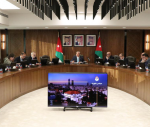You are here
World Bank approves $1.45b financing package to Kingdom
By JT - Jun 09,2019 - Last updated at Jun 09,2019
AMMAN — The World Bank Group’s Board of Executive Directors has approved a $1.45 billion financing package to Jordan, aimed at stimulating inclusive growth and creating jobs, a statement from group said on Wednesday.
The Second Equitable Growth and Job Creation Development Policy Loan (DPL2) contributes through “far-reaching and progressive reforms to launching Jordan as a country Open for Business”, the World Bank (WB) said in the statement.
The new package is designed to disburse in two equal tranches to support the government’s new economic plan for growth and to allow adequate time for completion of necessary additional reforms that are central to the achievement of the programme’s overall results, according to the statement.
A government official said last week that Jordan is expected to receive a sum of $950 million from the loan’s total this month.
“The package comes at a significantly lower financing cost than market rates and benefits from guarantees of $250 million by the United Kingdom and $200 million by the Kingdom of Saudi Arabia,” the WB said.
The terms of the loan are concessional, and the maturity of the loan is for 34 years, the global institution said.
“In financial terms, DPL2 provides significant advantage over market-based financing for budgetary needs,” the statement noted.
Over the last decade, Jordan has endured external shocks and regional challenges, including a sudden halt in its main energy supply, an inflow of an estimated 1.3 million Syrian refugees and a cut off of crucial trade routes through neighbouring states, the statement said, noting that Jordan “responded by conducting a massive fiscal consolidation while preserving its economic and social stability, growing at approximately 2 per cent annually over the past two years”.
A crucial element of DPL2 is to energise private sector growth by supporting reforms that promote foreign direct investments and exports in service sectors that are advantageous for Jordanians; streamline licensing and inspections to ease doing businesses, particularly for small businesses; improve credit infrastructure (through insolvency and secured transactions laws); and develop new regulations for public procurement to reduce fiscal costs and boost transparency.
“The reforms, which Jordan has already started, will strategically target economic elements in need of improvement,” the statement stressed.
This comprises promoting broadband services to harness the potential of the digital economy for Jordan’s youth and developing new legislation for public, private partnerships to institutionalise investment, it added.
It also includes addressing Jordan’s energy costs through a Roadmap for Financial Sustainability of the Energy Sector, a structural transformation that deals with the sector’s financial and operational viability and long-term regulatory environment, according to the bank.
“The World Bank remains committed to support Jordan in laying the foundations for a stronger and more outward oriented economy that maximises its growth potential and provides better opportunities for the Jordanian people,” Mashreq Regional Director at World Bank Group Saroj Kumar Jha was quoted in the statement as saying.
“We commend the government of Jordan’s commitment and efforts to opening its markets and creating opportunities for new investments in priority sectors of the economy,” he added.
On the social side, alongside Jordan’s growth agenda there must be a targeted, reliable social safety nets system, the WB highlighted, citing the recent endorsement of the National Social Protection Strategy and the National Aid Fund’s expansion programme (Takaful).
“The programme brings an improvement in the targeting system and adopts a digitalised payment system for better transparency,” the WB said.
Furthermore, “the government adopted a smart gender agenda”, the statement added, indicating the recent amendments to the Labour Law to promote and regulate flexible work and facilitate the establishment of childcare centres at the workplace.
“The DPL2 will allow Jordan to build on the momentum and take its reform programme forward,” World Bank Lead Economist Christos Kostopoulos said.
“The programme supports further improvements in the business environment and a simpler, less bureaucratic and more user-friendly investor journey. It will also promote the update of the legal framework for public procurement and the extension of the national broadband fibre access network. In addition, the DPL2 will allow the government to continue to expand and improve the targeting of social safety nets for the poor and vulnerable,” he underlined.
The DPL2 brings the World Bank Group’s total commitments to Jordan to $2.78 billion, of which $228.2 million are financed by the Global Concessional Financing Facility (GCFF), according to the group.
Launched in 2016, the GCFF provides concessional financing to middle income countries hosting large numbers of refugees at rates usually reserved for the poorest countries.
Related Articles
AMMAN — The World Bank (WB) decided to extend $500 million in concessional and non-concessional financing to support Jordan’s ongoing
AMMAN- The World Bank (WB) decided to extend $500 million in concessional financing to support Jordan's ongoing reforms to improve the econo
AMMAN — The World Bank (WB) will provide Jordan with $250 million in August as part of $500 million in concessional financing to support Jor















